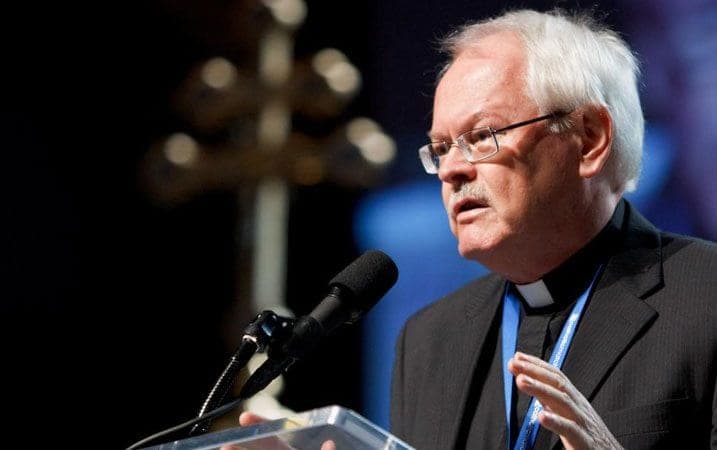In a few days, we Crux-sters will list some favorite books for Christmas gifts. In my category — spirituality — here’s an early recommendation: “The Holy Longing, The Search for a Christian Spirituality” by Catholic priest Ronald Rolheiser.
I mentioned this book before when I reprinted the evocative Johann Wolfgang Von Goethe poem, “The Holy Longing,” which inspired Rolheiser and with which he begins this book. He says a friend asked him to write something “that I can give to my adult children to explain why I still believe in God and why I still go to church — and that I can read on days when I am no longer sure why I believe or go to church.”
Rolheiser has succeeded beautifully, in no small part because, as his friend requested, he addresses both the devout, who never or rarely doubt, and those who doubt and struggle daily.
He speaks to the peaceful and serene few, but also to the rest of us who want to hold onto and deepen our faith. But we’re distracted or overwhelmed, frustrated, fed up, turned off, or pushed away.
“Everyone has to have a spirituality and everyone does have one, either a life-giving one or a destructive one,” he writes, and then shows us how to achieve the former.
There are four essential, non-negotiable pillars on the Rolheiser path to Christian spirituality:
Attention to private prayer and morality.
A life attuned to social justice.
Engagement in community worship — not just going to church from time to time, but committing to a community.
And fourth, something we don’t hear much about: keeping a “mellow heart and spirit.” No anger or bitterness or self-righteousness. No obsession with rules. “Becoming like Jesus is as much about having a relaxed and joyful heart as it is about believing and doing the right thing, as much about proper energy as about proper truth,” Rolheiser says.
But both liberal and conservative Catholics often ignore this fourth pillar, “rationalizing that our causes are so urgent, we are so wounded, and our world is so bad that, in our situation, anger and bitterness are justified.” Well, we’re wrong, he says. “The wrong God is both the God of the contemporary right and the contemporary left, that is, the God who is as wired, bitter, anxious, workaholic, neurotic, and unhappy as we are.”
All four pillars are needed for a complete Christianity, Rolheiser argues. Take one pillar away, the edifice falls.
Social justice without private prayer or private morality? Off the rails.
Private prayer and private morality, but no justice for the poor? Will not work.
“In the Christian scriptures, one in every ten lines deals directly with the physically poor and the call from God for us to respond to them. In the Gospel of Luke, that becomes every sixth line, and in the epistle of James, that commission is there, in one form or another, every fifth line.”
And as for Church commitment, Rolheiser says that many of us today “want God, but we don’t want Church.” We are “spiritual,” but not religious. Organized religion? Too authoritative, too backward, too corrupt, too whatever. We are constant critics of Catholicism.
I get that. I am one.
But here is Rolheiser’s clear-eyed rationale for why we should get on board with the Church nonetheless. Community matters. Moreover, “to be connected with the Church is to be associated with scoundrels, warmongers, fakes, child-molesters, murderers, adulterers, and hypocrites of every description.”
Yet at the same time, the Church “identifies you with saints and the finest persons of heroic soul within every time, country, race, and gender. To be a member of the Church is to carry the mantle of both the worst sin and the finest heroism of soul,” he says, “because the Church always looks exactly as it looked at the original crucifixion, God hung among thieves.”
Rolheiser also includes a chapter on the spirituality of sexuality — something, again, we don’t hear much about, particularly from priests. But Christian sexuality, he says, “is a beautiful, good, extremely powerful sacred energy given us by God and experienced in every cell of our being as an irrepressible urge to overcome our incompleteness, to move toward unity and consummation with that which is beyond us,” he says. “Indeed, some theologians see in sexual encounter a foretaste of the eternal life of heaven and many of the classical mystics use the image of sexual encounter to describe our ultimate union with God and creation.”
Okay then — something to look forward to.
“The Holy Longing,” published in 1999, became a mega-hit and remains for many a classic on spirituality. Rolheiser surely knows how to write. And he is filled with wisdom.

















